
Pablo Beltrán, ELN negotiator:
“We are in Havana on a peace mission, totally detached from military operations”
 Dianet Doimeadios Guerrero
Dianet Doimeadios Guerrero
Deputy director of Cubadebate. Holguín, 1988. Graduated from the Universidad de Oriente. Reporter for the newspaper “Ahora!” from 2010 to 2012. Contact: dianet@cubadebate.cu Twitter: @ddoimeG
Cuban journalist. Works in the Cuban Television Information System. He is a frequent panelist on the informative program Mesa Redonda de la Televisión Cubana. Permanent collaborator of Cubadebate.
July 13, 2020
Translated and edited by Walter Lippmann for CubaNews.
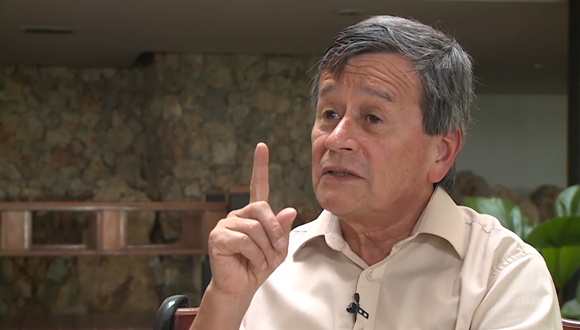
The commander of the National Liberation Army, Pablo Beltrán.
In Havana, one year and five months after the attack, Commander Pablo Beltrán states categorically in an exclusive interview with Cubadebate that none of the 10 members of the peace delegation of the National Liberation Army (ELN) were involved in the attack on the General Santander Police Cadet School in Bogotá. Not even himself, as a member of the Central Command (COCE).
After the event, which on January 17, 2019 took the lives of 22 students and the attacker himself, Colombian President Iván Duque Márquez decided to break off the peace talks with the ELN guerrillas and reactivate the arrest warrants against the members of the delegation, in Cuba since May 2018.
Today, the position of the Cuban authorities to respect the protocol of breaking the talks between the Colombian government and the ELN, and the decision not to extradite the guerrillas, are being used to question and manipulate the role of the Island as a guarantor of the peace process. Beltrán insists that the peace negotiators are “totally detached from any question of military operations” on Colombian soil.
-Commander Beltrán, what is your opinion on the Colombian Government’s argument for requesting the extradition of some of the members of the delegation following the attack on the cadet school?
-First, since we arrived in Cuba in May 2018, a commitment was made. It was the Santos Government and the National Liberation Army who asked Cuba to host the talks, as a guarantor country. That is why we came here, at the request of the parties. And Cuba, as a guarantor country, responded to that request. Secondly, when the new government was installed, it did not say: “Hey, come on,” but rather it said: “Stay there and let’s have a discreet meeting, let’s see what the other government left behind and we’ll restart”.
“When there was an attack by one of our guerrillas on a militarized police school in Bogotá in January 2019, it occurred to them to say that the delegation, even though it was here in Havana, was responsible. Something pulled out of their hat, isn’t it? Because we are here and, besides, I am a member of the national leadership of the ELN, but that does not mean that I am aware of or am commanding military operations in Colombia. My specific task is this whole process of dialogue.
“I am away from that, but even so, they insist on saying that the delegation had something to do with the attack, and based on that they ask Cuba for extradition, but the extradition is requested through Interpol. It turns out that Interpol’s statute, in chapter III, says that this type of matter does not proceed when there are conflicts between parties, that is, an internal Colombian conflict”.
-So you rule out any link between the peace delegation and the attack on the General Santander Police Cadet School in Bogotá?
-Yes, because we are here in Havana on a peace mission and totally detached from any issue of military operations; neither by communications nor by command, we have nothing to do with that, because that was the commitment we made with the two governments, the Colombian and the Cuban.
“I tell you, moreover, a specificity of how the ELN is structured. We have a national leadership, with about 20 members; a kind of executive, the central command, which there are five of us. We also have a body in charge of planning and conducting the operations, the General Staff. It is led by the military head of the central command, who is not me. So, the lines of operation that are drawn, the details of the operations, the times of the operations, the targets chosen, that’s strictly the management of the General Staff.
-Are there any members of the General Staff in Havana?
-No, there isn’t. The military leader of the ELN is Antonio Garcia. He was here in negotiations, but as in 2005, 15 years ago.
-Do you consider that the rupture and the crisis it has generated have been used to attack the guarantor countries?
-Very much so.
-There is information that relates this issue to the inclusion of Cuba in the list that the US Government is drawing up of countries that supposedly do not do enough in the fight against terrorism. How do you assess the position of the guarantors? Have they complied with the law, with the protocols written in black and white?
-It is a law of international peace negotiations to protect negotiating delegations, and the mechanism used is to sign a safe return protocol. We signed the agenda for the negotiations on 30 March 2016 in Caracas, and on 5 April, five days later, we signed the operating protocols, including the protocol of rupture, which is signed by the Colombian government, the ELN and five guarantor countries. That gives it the status of an international agreement; it was not just that Santos signed it, no, it is an international agreement and as such it has to be complied with.
“So, what the guarantor countries have said to the Colombian Government is that they are not going to dishonor their functions as guarantors. The focus of Norway’s foreign policy is the promotion of peace, and they accompany many processes around the world. The day that Norway says that it invalidates its responsibilities as a guarantor country is the day that it ends up accompanying peace processes.
“No one in the international community is going to do that, because in a world that has to be multilateral, every time there are conflicts there will have to be negotiations and negotiating teams; otherwise, there will be no more multilateralism”.
-And what do the protocols say about breaking up? What guarantees of life do they give to the parties who sit down at a table to dialogue?
-The Government of Colombia is committed to returning us safely to our camps, from where we left to conduct these negotiations; the guarantor countries, as has been the custom throughout these negotiations, are committed to accompanying us from the time we leave the negotiating site until we reach a safe place. That is what the safe return protocol strictly says.
“The guarantor countries have told the Government of Bogotá that their position to demand compliance with the protocol of rupture is invariable; neither today, nor tomorrow, nor next year, nor the following century will they change it. And the whole of the international community is increasingly accompanying the guarantor countries in this defense of the protocols”.
-Did Duque give any indication of an intention to break the dialogue table before the attack?
-The first thing they did the day after they positioned themselves was to put Ceballos (Miguel Ceballos Arevalo, High Commissioner for Peace) on the phone with me. I was here in Havana. He told me, “Well, we are going to hold a discreet meeting for several days, a part of the ELN delegation that is in Havana. That’s how contact began. Duque spoke of reviewing and making a connection with what Santos had left; but they never did it, they did not even deign to receive the agreements. And when they asked Duque what he was going to do with the agreements Santos had signed, he said ‘those are not valid because I did not sign them’.
“Then there were jokes in Colombia like ‘well, then he shouldn’t pay the foreign debt, because he didn’t sign it… since it’s eating up half of our GDP.
-Santos did not sign, the Colombian State did.
-Sure. The Constitutional Court said that at least three governments in a row are obliged to implement the Peace Accords. That’s what the Court says, but the government doesn’t care.
-Although the agreement is legally protected…
-If you look, Congress is closed, the president has already issued 160 executive orders governing, doing and undoing everything they could not do when Congress was open. The prosecutor is an employee of the president… That’s a dictatorship.
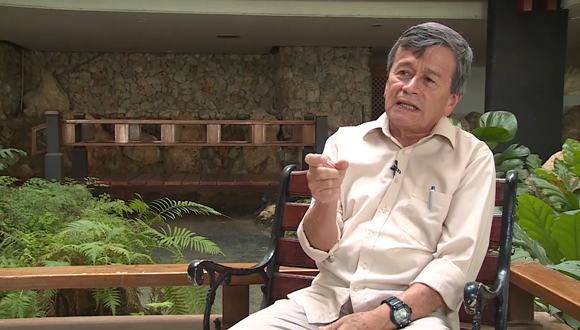
The guarantor countries have told the Bogotá government that their position in demanding compliance with the break-up protocol is unchanged, Beltrán says.
-In recent months, the ELN has taken some decisions that have been well-received by public opinion in the midst of the crisis in the peace process. For example, ceasefires and the release of detainees. How should these gestures be interpreted? Are they sending a message to the Government of Iván Duque?
-It has several interpretations. One is that the government is being told that the ELN is in a position to make peace, to pursue a political solution, and we invite it to join in. The other is that, in the Colombian conflict, the main victims are non-combatants, the population in general; the most impoverished and excluded areas are those that suffer the most. Therefore, every gesture that we can make has a fundamentally humanitarian message, it is not only as if we were ingratiating ourselves with the Government; it is also an invitation and, in essence, a humanitarian gesture.
-In the last few days, you have said that there will be no more unilateral ceasefires, only bilateral ones.
-Yes.
-Why?
-When the United Nations Secretary-General, António Guterres, called a ceasefire in March to better confront the pandemic, we accepted the proposal and made a unilateral ceasefire, but unfortunately, the military and paramilitary forces of the government took military advantage of that.
“For example, in many regions where we are, the persecution and assassination of social and community leaders has increased. So, today we say that we have the disposition for a new cease-fire in compliance with the United Nations resolution, but we also tell the government to participate, to join in a bilateral cease-fire that, in the end, is what will allow us to better confront the pandemic.
“I do not have a precise figure, but several hundred members of the Colombian Armed Forces are infected. There are countries that have had to confine their military forces due to the high level of contagion. It is not only a question raised by the UN; there is also a real threat of contagion within the armed forces”.
-But the government has already responded…
-The government’s a little tangled. President Duque went out on a tweet to say that he was setting conditions for the ELN to enter into a bilateral ceasefire, and it turns out that he is knocking on the wrong door, because it is the Security Council that is demanding the 90-day ceasefire, not the ELN. So let him answer the Security Council.
“We accept the call, the demand of the Council, and we believe that the best way is through bi-lateralism: that the government does it and the ELN does it. The response given by President Duque to the ELN is to knock on the wrong door and [that] does not exempt it from responding to the Security Council”.
-What do you think about the conditions that Duque has set for the bilateral ceasefire for 90 days? For example, he demands that the detainees be released.
This is the dark side of the matter, because, before he was in government, Duque was part of a very violent extreme right-wing coalition in Colombia, led by former President Uribe, which moves with a slogan: ‘Shatter the peace’. So, everything that the previous Santos government did, they came to hinder it.
“They come into the government and what are they going to do, well, shatter the peace. And they have done it. One example: as a result of the Peace Agreement of 2016, voluntary substitution plans were agreed upon with thousands of peasant communities that grow crops for illicit use, in order to eliminate those crops and start new ones, to promote the peasant economy. The first thing Duque did was to obey the dictates of Trump, who says ‘that’s not valid, and does me the favor and sprays me with glyphosate’. From that point on, social protest exploded throughout the region, with people demanding the fulfillment of the agreements and the army and police forcibly settling down, mistreating peasants and murdering several of them. Why? Because they were following orders from Trump.
“In Colombia, there is a very strong discussion, because it is a loss of sovereignty and the people who analyze Colombian foreign policy say that never had there been such a dark time, of so much unconditionality of the Government of Bogota before Washington. So, the problem is not only that Colombians want the peace process, it is that we have to fight with the United States to let it flow”.
-That could explain such a radical change in the Colombian State in the face of the dialogues with the ELN, the transformation of Santos to Duque. What else or who is moving Duque?
-Last Monday, former President Uribe had the idea of saying in a forum, I believe in Madrid, that the progressive opposition forces that want to reach the government in 2022 are a kind of reissue of Castro-chavism. Former President Uribe said this on Monday and Duque repeated it on Wednesday. I remember what Freud says, that when two people say the same thing, there is only one who thinks.
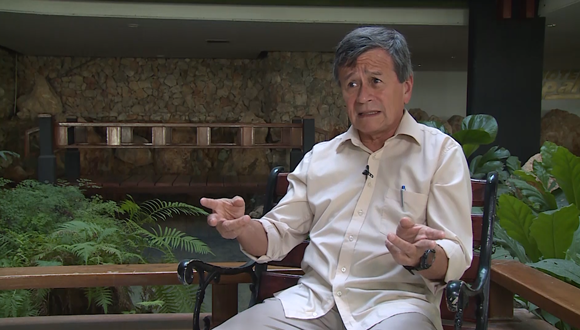
Duque was part of a very violent far-right coalition in Colombia, led by former President Uribe, he says.
-But during the first five months of the Duque government you were in dialogue. Could you cite some examples of the rapprochement between the guerrillas and the Executive?
-The coalition in the government is very diverse, a mix that ranges from fundamentalist evangelicals to the violent extreme right, including right-wing academics. There are some who agree with the dialogue and others who do not. We sent a peace officer last December to talk to former President Uribe and several contacts were made. At the end of December, he was arrested.
“So, if someone goes with goodwill to make discreet contacts and the same person who attends to him penalizes him, how do you build trust? I saw in the press on Thursday that in the prison where they are holding him, two dozen people have already been infected by COVID-19. There he is paying for this effort for peace.
-Can it also be said that Ceballos Arevalo, the Colombian government’s high commissioner for peace, changed his speech?
-That is a very serious problem in Colombia, because in the bureaucratic distribution of the government coalition, the position of peace commissioner is assigned to the Conservative Party. So, the faction of the Conservative Party that is with Uribe does so with Vice President Marta Lucía Ramírez, who is the head of Ceballos. But, at the same time, there is a think tank from an extreme right-wing university, Sergio Arboleda, from which Duque and Ceballos came, and the prosecutor who sets the lines on what to do in government. Surprise! Among the owners of that university is the Díaz-Balart family. What a small world, right?
-Is there any support or opposition from Colombian society and the political elite for breaking the dialogue between the government and the ELN?
-Colombia today is experiencing a kind of political storm that is coming. This week there have been several pronouncements in favor of resumption of the peace agreements. On Monday, Monsignor Monsalve, Archbishop of Cali, said: ‘They are carrying out a genocide with the agreements and with FARC’. More than 220 ex-combatants have been killed, more than 50 of their relatives have been killed… They are displaced, persecuted. They are displaced, persecuted. The intention to destroy peace was not left only for the papers, the people are suffering from it.
“Also on Monday, 94 U.S. congressmen told Duque (that is, Secretary Pompeo): ‘You have to guarantee compliance with the peace agreements; second, you have to stop the assassination of social leaders in Colombia and former combatants; third, you have to dismantle your paramilitary forces. On Wednesday, an important group of Colombian congressmen told Duque: ‘President, agree to a bilateral ceasefire with the ELN’. Very serious things are happening against peace. The political storm is no longer in the Colombian sphere and is now in a wider sphere”.
-Have you ever been sent from Colombia to stand up at the dialogue table?
-No, because the first instruction given to us by the national leadership is that we are never going to get up from the dialogue table, no matter how big the obstacles, the attacks. What we have said to the government is “name your delegate”. Ah, if you don’t want your delegates, then we will return to the camps.
-Is there any chance that the dialogue between the Colombian government and the ELN will be resumed?
-Yes. -Next month, Duque will barely be two years in office. He will have another two years left, and we have indications that all governments want to go down in history because they did something for peace, because that pays off politically, even if they do not do anything very concrete. This government must not be the exception and, furthermore, pressure from Colombian society and the international community to respect the peace agreements and resume dialogue continues to grow.
-In the medium and long term, do you see a definitive solution to the continuation of the revolutionary option through armed means?
-When there is a regime that no longer only kills leftist activists or leaders in Bogotá, but also indigenous leaders, peasants, it is committing genocide, systematic extermination. When you face that kind of extermination, the only thing that saves you is to defend yourself, to resist. In our case, we say that we have a firm commitment to agree an end to the armed conflict, but that this also implies transformations, because if you remove the consequences but leave the causes intact, the conflict remains.
“The most serious cause is the violence of politics. The majority in Colombia believe that Uribe is happy to bring violence into politics and he will be the last one to take the violence out of politics. We have the sincere willingness, but we doubt that the system has it. We say ‘count on the ELN for the political solution’, but the ELN will defend itself and resist.
-What conditions would they set to disarm?
-Colombia is a very complex country. I am going to give you a figure from about ten years ago, when they made a survey of the number of weapons they had given to civilians who were sympathetic to the extreme right. Two million. The Colombian Army and the Police total 500 000.
“When one talks about taking violence out of politics, it is not only that the army and the police stop considering everyone who opposes them as an internal enemy, but that everyone’s weapons are put on the table, because if it is only going to be the ELN’s, that is a story for minors.
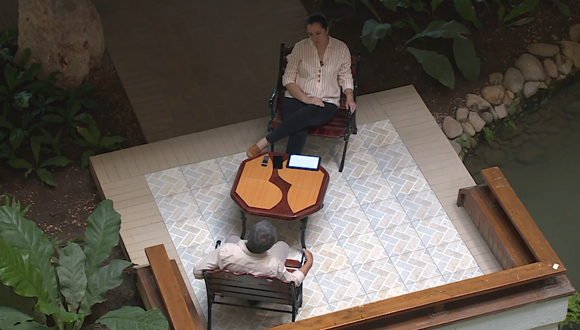
La mayoría en Colombia considera que Uribe está contento metiéndole violencia a la política.
-What lessons does Pablo Beltrán draw from the Peace Agreement signed by the FARC and the Executive, as well as from the process for its implementation?
-In 2016, we were finishing the confidential phase and beginning the public phase of negotiations with Santos. Everyone was telling us ‘do as the FARC does’. Last year they began to tell us, ‘Be careful, they are going to do the same as [they did to] the FARC’. That is what is being said in the streets of Colombia. What does this mean: that we are really facing an adversary that does not comply, neither in word nor in writing. How many are the members of the UN? About 200? That’s not good enough for them. The government does the same with all the pacts it makes after every social protest. So, if you have to negotiate with someone who does not comply, what rules do you make up?
“In the last round we had here in Havana with Santos, we were going to agree on one last bilateral cease and desist. We agreed with him on a 101-day period and we were going to agree on another one, so that when he left and Duque arrived he would find an active bilateral cessation. We couldn’t. We put a condition on them: a clause like the one used in international negotiations: if you fail to comply, you pay. We told them ‘let’s put another clause, if you default I default’; that is, the day you default, you authorize me to default, but by reciprocity.
“I believe the government delegate did not sleep that night. We told him ‘analyze that and tell us tomorrow’, and the next day he told us. “No, I called Bogota and they don’t want to know anything about it. They don’t want to know about reciprocity or any cost for not complying, which is what would guarantee the seriousness of a negotiation”.
-What is the situation of the guerrillas? Are they isolated or do they still have popular support?
-On Saturday, July 4th, we celebrated our 56th anniversary… Do you think that if important sectors of the Colombian people did not support us, we would be alive? What technique, technology, force or counter-insurgency resource that the United States has invented is not first tested in Colombia? It is not a merely military matter; it is, fundamentally, to have a social insertion. Whoever does not have it dies, whoever loses it becomes extinct.
-Analyzing the political situation in Colombia, the crisis of Uribism, the low popularity of the current president, the emerging political forces… Will the peace negotiations have any chance in the short- or medium-term?
-They have not one, but two chances. In the short term, a government, the deeper it is in a situation of illegitimacy – and there is also a loss of acceptance – could resort to the negotiating table as if to take a breath. In the medium term – and this is what we think will be more serious – the situation in Colombia is maturing so that by 2022 there will be a progressive government.
“The progressive force that opposed Iván Duque in 2018 obtained 44% of the votes. This is something historic, it has never happened before in Colombia. That force is there and it is growing. For us, to have a progressive government would be to have a valid interlocutor for peace negotiations.
-Then, will they manage to get violence out of politics? Is the ELN willing to do politics in times of peace?
-We are already doing politics, for a very simple reason. In the tradition of how the guerrillas organized themselves, we organized ourselves in a more Guevarist style, because the tradition was to build a party, an army and a front. We built a political-military organization, which has more democracy than an army, of course, but also a level of centralization. What does that imply? That we have a rural guerrilla, in uniform and with a rifle, but we have an ELN inserted in the population, both in the countryside and in the city, a clandestine militancy whose task is to accompany and organize the people every day. There will not be a political and social protest in Colombia where we are not, but they are not going to wear the ELN bracelet, they are the ELN that are there with the people.
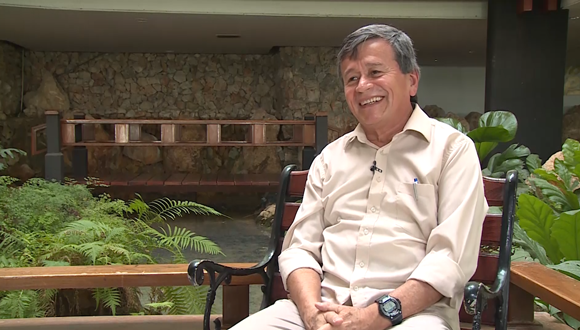
The commander of the National Liberation Army, and negotiator in Havana, Pablo Beltrán.
-Will there ever be peace in Colombia?
-We asked a FARC leader who was killed in this war, Alfonso Cano – with whom the ELN coordinated very well – about this once in a debate, and Alfonso said: ‘Nothing that the people get will be given away, everything has to be fought for. And what is the greatest good? Peace. Will they give it away? It must be fought [for].
“We will never abandon the path of seeking a political solution, but we will always defend ourselves. We have no vocation for martyrdom. One chooses these things because one considers that it is worth living and dying for them; otherwise, one would not choose this path.
In video, interview with Commander Pablo Beltrán


You must be logged in to post a comment.